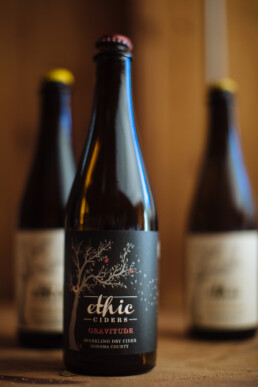


"It became crystal clear to us that cider had the potential to express the unique characteristics of our local fruit and also help preserve the regional apple heritage of Sebastopol."
Experimenting with small cider batches in their barn sparked an even greater passion for cider and the apples that make it possible. This led the Lawtons to the Permaculture Skills Center in Sebastopol, where Ryan Johnston was a program director actively working with local community organizers and organic growers. Johnston had gathered over 60 varieties of apples to share with the community. Now Johnston is the orchardist and cider maker for Ethic Ciders.
“Having grown up in West Sonoma County, Ryan brought a focus on regenerative agriculture and a strong connection with the local community,” Lawton says. “We bonded quickly over our passions for all things made of apple. Soon after, we began assessing the viability of building a cider business that was sustainable from both a farming perspective and also a financial perspective.”
Making quality cider is just one part of the Ethic Ciders philosophy. Lawton and his team are focused on connecting with people and keeping the area’s orchard traditions alive.
“When we think of community, we really see Ethic as a part of many communities that come together here in Sonoma County,” Lawton says. “It’s local farmers who grow the ingredients for great ciders. It’s our fellow cider, beer and wine makers that share the passion and techniques for creating amazing beverages with one another. And it’s the grass roots organizations like Slow Foods, Rare Fruit Growers, Farm Trails and many others that support local makers like us here in the county.”

The name Ethic Ciders was inspired by Lawton and Johnston’s belief that “making top quality ciders comes from staying true to the fruit.” They start with the highest quality organic ingredients and then ferment slowly, stirring every day to preserve the apples’ delicate flavors and aromas. Every apple variety is fermented separately then blended after fermentation, to let the fruit’s unique character shine. Ethic uses local heirloom apple varieties such as Gravenstein, Johnathan, Golden Delicious and Rhode Island Greening apples along with wild berries and botanicals — all sustainably grown in Sonoma County. On their farm Ethic has also replanted a dozen varieties of traditional cider apples and the planting continues.
“Our goal is not year-to-year uniformity, it’s beauty and balance, which starts with ecological orchard management” Johnston says. “These practices are labor intensive and time consuming, but as makers it’s our way of respecting and ultimately celebrating a sense of place that expresses through flavor.”
Ethic’s ciders are available to ship direct to consumers in 36 states and sold at over a dozen local stores, including Whole Foods and and Oliver’s Market locations. And the company is growing … in a slow, deliberate way.
“Our growth plans are firmly rooted in the idea that we will continue to release ciders that are reflective of the local fruit and character of Sonoma County as well as working to have a tasting room at our farm in Sebastopol to further connect our community at large,” Lawton says.

